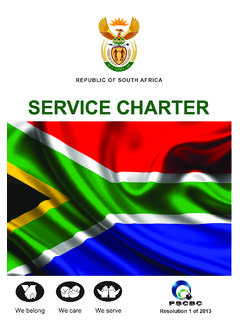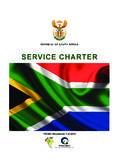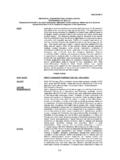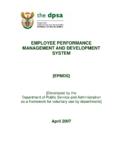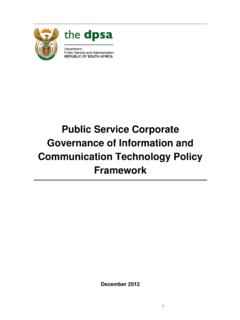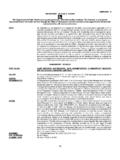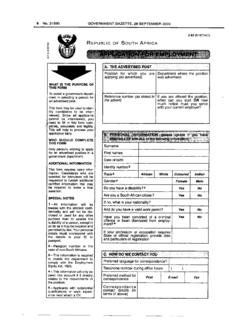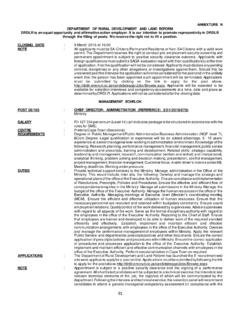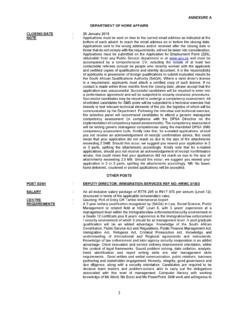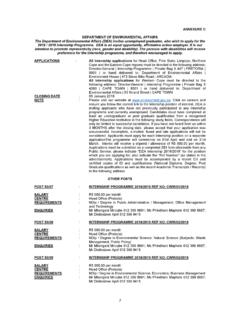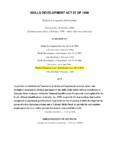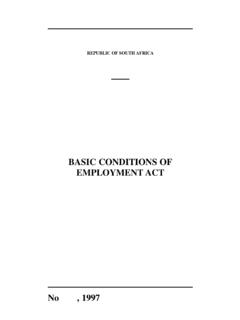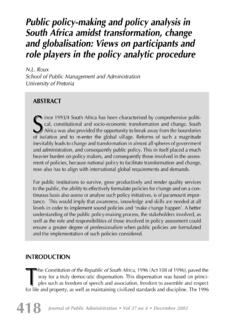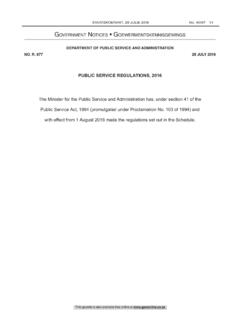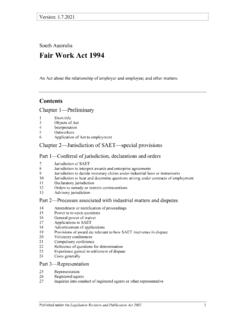Transcription of Labour Relations Policy Framework for the Public Service
1 Labour Relations Policy Framework . FOR THE Public Service . JvdH 04022501 SZ LR Policy TABLE OF CONTENTS. 1. Introduction ..1. 2. 3. Principles ..1. 4. Legislative Framework ..2. 5. 6. Labour Relations Areas` ..3. Unionisation ..3. Organisational Rights of Trade Collective Bargaining ..5. Demarcation/Variation of Workplace Designation of Essential Dispute Resolution ..8. Disputes of interest ..8. Disputes of right ..10. Protest Action ..11. Picketing ..11. Discipline ..12. Incapacity ..12. Abscondments ..14. Service benefits ..15. JvdH 02101801 SZ. Labour Relations Training ..16. Monitoring and 7. Annexure A ..18. JvdH 02101801 SZ. Labour Relations Policy Framework FOR THE. Public Service . 1. INTRODUCTION. The impact and effect of globalisation on South Africa, requires the Public Service , like other sectors of the economy, to rapidly adapt to the changing environment.
2 The Public Service is composed of approximately million workers and accounts for about a fifth of all formal employment and about a tenth of the Labour force as a whole. This makes it the largest single employer in the country. In view of the strategic role that the Public Service has to play in shaping the economic destiny of the country, it needs to change its mindset and transcend past practices of iniquitous Labour Relations based on race discrimination and strive for Labour peace and equality in the work place. To this end the Minister for the Public Service and Administration is empowered by the Public Service Act, 1994 , to develop a Labour Relations Policy for the Public Service . 2. PURPOSE. Recognising the legislative mandate conferred on the Minister to develop a Policy relating to la- bour Relations in the Public Service , it is the intention of the Policy to.
3 Clarify the position of the Public Service in respect of the various areas of Labour Relations ;. give guidance on the application of various pieces of legislation that govern employment Relations in the Public Service ;. provide a Framework within which departmental policies on Labour Relations can be devel- oped. promote consistency in management decisions and continuity despite changes in man- agement. 3. PRINCIPLES. Underpinning the Policy are inter alia the following principles: The Public Service must play a key role in shaping the direction of the economy of the country. Human potential in the Public Service must be maximised through sound human resource management and career development. JvdH 02101801 SZ 1. The relationship between the employer and the employee is regulated by the contract of employment concluded between the parties and the conditions of employment recorded in various collective agreements.
4 Organised Labour and the employer are social partners and have an equal stake in the la- bour Relations of the Public Service . Labour Relations should, as far as possible, be conducted in a non-adversarial climate. Employees and the employer have constitutional and other legal Labour rights. Labour Relations in the Public Service are conducted at various levels, namely national, sec- toral and departmental and provincial levels. The Public Service must provide an efficient Service to the community in the most cost ef- fective manner. Labour Relations in the Public Service must support the principles of Batho Pele. 4. LEGISLATIVE Framework . Labour Relations in the Public Service are governed by a myriad of acts of which the following are the most important: Constitution of the Republic of South Africa, 1996. Public Service Act, 1994 . The Employment of Educators Act, 1994 .
5 South African Police Service Act, 1998. Correctional Service Act 111, 1998. National Prosecuting Authority Act 32, 1998. Labour Relations Act, 1995. Basic Conditions of Employment Act, 1997. Skills Development Act, 1998. Employment Equity Act, 1999. Public Finance Management Act, 1999. Promotion of Administrative Justice Act, 2000. Promotion of Access to Information Act, 2000. The legislative Framework is further enhanced through a number of collective agreements reached in the Public Service Co-ordinating Bargaining Council (PSCBC) and the various sec- toral bargaining councils. JvdH 02101801 SZ 2. 5. SCOPE. The Policy is applicable to all Public servants excluding members of the . National Intelligence Agency;. South African Secret Service ; and South African National Defence Force Members of the above-mentioned institutions are not covered by the Labour Relations Act, 1995.
6 The above institutions need to establish their own Labour relation policies. In respect of sectors in the Public Service that have their own Labour Relations policies, this pol- icy will only apply insofar as it is not contrary to such policies. 6. Labour Relations Policy Framework :- AREAS COVERED. Unless the context indicates otherwise, reference in this section of the Policy to . (a) department must be construed as a reference to a provincial administration, provincial department and/or national department and (b) departmental level must also be construed as a reference to the provincial level Unionisation The principle of freedom of association and the right of all employees to form and join trade unions of their choice is acknowledged. Employees are free to elect not to join a trade union. Those who do, as well as those who join trade unions not represented in the PSCBC are liable to pay an agency shop fee agreed to in the PSCBC.
7 Members of the SMS are exempted from the payment of the agency shop fee as per agreement. However, these employees are free to join, or not to join, any trade union. They are excluded from the bargaining unit as they act as representatives of the employer. The spirit of the Labour Relations Act on the non-proliferation of trade unions is supported. Engagement with fewer, bigger unions that are well organised is there- fore supported. JvdH 02101801 SZ 3. Organisational Rights of Trade Unions The granting of organisational rights to trade unions should occur at departmental level. Departments should determine the number of employees to be represented by a specific union for it to qualify for organisational rights. the threshold of repre- sentativenes. Provisions regarding organisational rights should be contained in an organisational rights agreement.
8 Such agreements should be concluded taking into account any Framework developed on this aspect at the PSCBC, sectoral, or provincial level. A trade union could qualify for inter alia the following organisational rights . q Trade union access to the workplace q Deduction of trade union subscriptions q Election of shop stewards q Leave for trade union activities q Disclosure of information Admission of a trade union to the PSCBC or a sectoral bargaining council does not mean that all the above-mentioned rights are automatically conferred on such a union. In terms of section 19 of the Labour Relations Act, such a union only ob- tains the rights of access to the workplace and the deduction of subscriptions of its members. To obtain other organisational rights, a union should act in terms of section 21 and 22 of the LRA. Unless a collective agreement on recognition/organisational rights determines oth- erwise, a union qualifies for the right to elect representatives and for the right to disclosure of information, only if it represents the majority (50% + 1) of the employ- ees in the workplace, if it is regarded as a representative trade union.
9 The number of trade union representatives depends on the size of the workforce in terms of section 14(2) of the LRA or a collective agreement in this regard. Granting of organisational rights to trade unions should be based on audited mem- bership figures or as may be agreed between the parties. If a trade union is a party to a collective agreement at PSCBC or sectoral level it qualifies to exercise any right established by such an agreement in a department, unless otherwise determined. JvdH 02101801 SZ 4. The principle of full-time shop stewards for the Public Service is supported, pro- vided that it is arranged in terms of a collective agreement. Leave for elected shop stewards, other than full-time shop stewards, must be granted according to a collective agreement on the matter. Any action by a trade union (excluding action protected in terms of the Labour Re- lations Act) that disrupts the Service delivery of a department may result in the suspension of organisational rights, provided the union is granted the opportunity to rectify the situation.
10 Before organisational rights are withdrawn, a process of conciliation and arbitration need to be entered into. Collective Bargaining Collective bargaining as a mechanism to address matters of mutual interest be- tween the employer and employees (as represented by representative trade un- ions) is acknowledged and supported. Collective bargaining in the Public Service occurs at various levels where engage- ment between employer and employees takes place. Matters that concern all Public servants or employees of more than one demar- cated sector are negotiated at national (PSCBC) level. Collective bargaining at sectoral level should deal with matters that are specific to the relevant sector. Collective bargaining at departmental level should only deal with matters with re- gard to which the executing authority has the requisite power. Although collective bargaining at departmental level is supported, such bargaining should take place in chambers of the sectoral bargaining councils.
